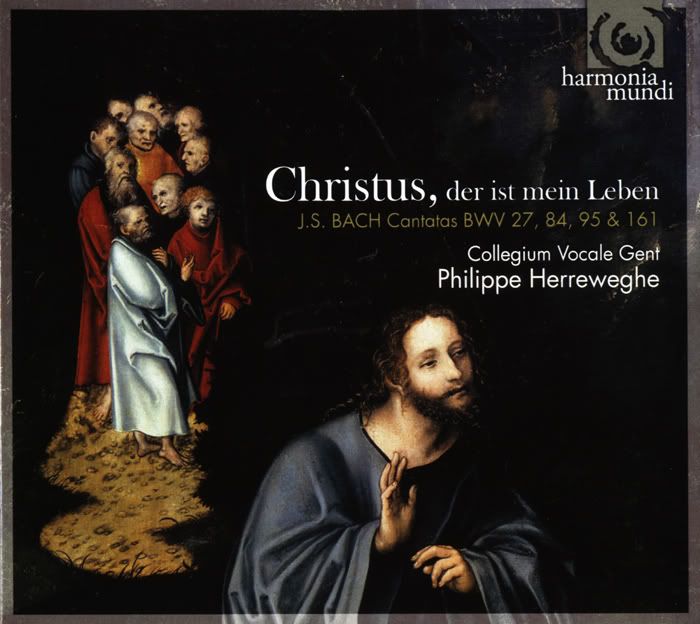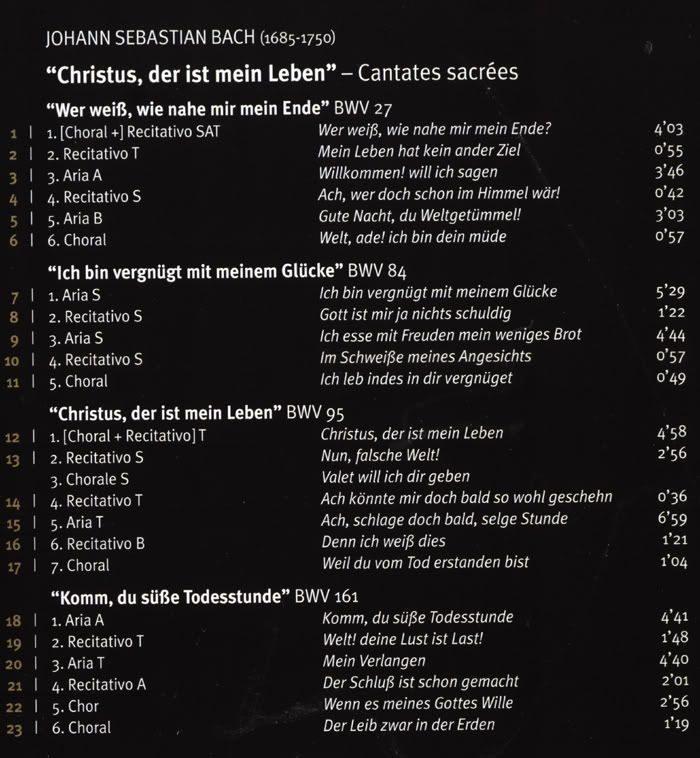Pro Member
Group: Members
Posts: 695
Warn:0%
|
 |
|
Johann Sebastian Bach (1685 - 1750)Cantatas - Christus, der ist mein LebenLabel: Harmonia Mundi, HMC 901969 Year: 2008 Performers:Thomas Bauer - bass Hans Jorg Mammel - tenor Dorothee Mields - soprano Matthew White - countertenor Collegium Vocale Gent Philippe Herreweghe - conductor This 2008 Harmonia Mundi recording of Philippe Herreweghe leading the Collegium Vocale Gent represents Bach at his most poetically grim. Opening with "Wer weiss, wie nahe mir mein Ende" (Who knows how soon my end is) (BWV 27) and closing with "Komm, du susse Todesstunde" (Come, sweet hour of death) (BWV 161), it incarnates the grim ethos of the great Baroque composer.
Herreweghe's recording is warmly polished and deeply expressive. The vocal soloists, particularly the sweet soprano Dorothee Mields in "Ich bin vergnugt mit meinem Glucke" (I am content with my fate) (BWV 84), are consistently impressive. The chorus is small, only 16 voices, but its refined tone, clear articulation, and sheer enthusiasm are winning, especially in the polyphonic choral that opens "Christus, der ist mein Leben" (Christ, there is my Life) (BWV 95). Herreweghe is an able and expressive Bach conductor who knows how to clarify dense counterpoint and reveal the emotional and spiritual core of a work. For those listeners who can either ignore or embrace poetic ideas like "Come, put an end to my distress, O long desired death" from the tenor aria in "Christus, der ist mein Leben," this disc will offer substantial rewards. Those looking for more upbeat sentiments should look elsewhere. Harmonia Mundi's digital sound is richly detailed and lushly colorful.Although Bach had dreamt of establishing a ‘well-regulated church music’ since his early days, it was only between 1723 and 1750 that he finally had the chance to do so, as Kantor and Director Musices in Leipzig. Here he invented the ‘modern’ cantata, combining chorales and traditional biblical texts with arias and recitatives on freely composed texts. The four cantatas recorded by Philippe Herreweghe offer a magisterial demonstration of the transition from cantatas initially judged ‘too theatrical’ to a perfectly achieved form – as in the cantata BWV 84, among the very last to be written.It's supposed to be spring, but the snow is falling heavily outside, and, after an extraordinarily long winter the formerly abstract concept of depression is assuming a more personal presence with every passing minute. Then, you hear Dorothee Mields singing "Ich esse mit Freuden mein weniges Brot" (I eat my meager bread with joy), and somehow your dimmed spirit is lightened and uplifted--and you realize once again the transcendent power of Bach's music. (Perhaps it's no surprise that this cantata's theme is to be happy with what you have!) Even this practical, functional music can bring light and life to all who listen--and certainly also to those who sing and play it.
The cantatas featured on this program--first-rate performances all--span the years 1716 to 1727, and those who wish to explore changes in style or practice will have much to indulge their interest. But for the pure listener these four cantatas also offer tremendous variety of voices, instrumental color and texture, and plentiful examples of Bach's uniquely imagined and integrated melody and obbligato parts.
The three-section opening chorus of BWV 95, which joins two chorales by means of an almost oddly interrupting tenor recitative, is one of Bach's most curious, fascinating, unusual, and surprising cantata choruses--well worth hearing several times by itself; but also worth a repeat or two is Mields' tenderly sung "Valet will ich dir geben", her melody (which many church-goers will recognize as the tune to "All glory, laud, and honor"--in triple meter) accompanied by two oboes d'amore in one of those inimitable Bachian obbligatos.
Also notable are bass Thomas Bauer, his rich, confident voice particularly compelling in "Gute Nacht..." from BWV 27, tenor Hans Jorg Mammel in the difficult "Ach, schlage doch bald" aria and delicate "Welt! deine Lust ist Last!" recitative, and alto Matthew White in the poignant aria "Komm, du su?e Todesstunde" (here the original Weimar version with two recorders). And by programming the earliest cantata last (BWV 161), we're left hearing one of Bach's more delightfully, perfectly scored choruses that makes something inside us dance every time we hear it. The sound is fittingly intimate but with plenty of body and resonance appropriate to bring out the natural qualities of instrumental and vocal timbres. Exceptional!
--David Vernier, ClassicsToday.comTracklist:Wer weiss, wie nahe mir mein Ende, BWV 27 Ich bin vergnugt mit meinem Glucke, das mir der liebe Gott beschert, BWV 84 Christus, der ist mein Leben, BWV 95 Komm, du susse Todesstunde, BWV 161   LOG LOG| SPOILER! | EAC extraction logfile from 3. July 2008, 12:29 for CD
Collegium Vocale Gent, Philippe Herreweghe / J.S.Bach - Cantatas - Christus, der ist mein Leben
Used drive : HL-DT-STDVDRAM GSA-H62N Adapter: 2 ID: 1
Read mode : Secure with NO C2, accurate stream, disable cache
Read offset correction : 667
Overread into Lead-In and Lead-Out : No
Used output format : C:\Program Files\FLAC\flac.exe (User Defined Encoder)
320 kBit/s
Additional command line options : -8 -V -T "ARTIST=%a" -T "TITLE=%t" -T "ALBUM=%g" -T "DATE=%y" -T "TRACKNUMBER=%n" -T "GENRE=%m" -T "COMMENT=EAC FLAC -8" %s
Other options :
Fill up missing offset samples with silence : Yes
Delete leading and trailing silent blocks : No
Native Win32 interface for Win NT & 2000
Track 1
Filename E:\X\Johann Sebastian Bach - Cantatas - Christus, der ist mein Leben (2008) [FLAC]\01 - Cantata BWV 27 - 1.Recitativo 'Wer weiss, wie nahe mir mein Ende'.wav
Pre-gap length 0:00:02.00
Peak level 100.0 %
Track quality 100.0 %
Test CRC A2946915
Copy CRC A2946915
Copy OK
Track 2
Filename E:\X\Johann Sebastian Bach - Cantatas - Christus, der ist mein Leben (2008) [FLAC]\02 - Cantata BWV 27 - 2.Recitativo 'Mein Leben hat kein ander Ziel'.wav
Peak level 29.8 %
Track quality 100.0 %
Test CRC 81AA2C8C
Copy CRC 81AA2C8C
Copy OK
Track 3
Filename E:\X\Johann Sebastian Bach - Cantatas - Christus, der ist mein Leben (2008) [FLAC]\03 - Cantata BWV 27 - 3.Aria 'Willkommen, will ich sagen'.wav
Peak level 76.5 %
Track quality 100.0 %
Test CRC 7FBEF1D7
Copy CRC 7FBEF1D7
Copy OK
Track 4
Filename E:\X\Johann Sebastian Bach - Cantatas - Christus, der ist mein Leben (2008) [FLAC]\04 - Cantata BWV 27 - 4.Recitativo 'Ach, wer doch schon im Himmel waer'.wav
Peak level 94.5 %
Track quality 100.0 %
Test CRC 08ED252C
Copy CRC 08ED252C
Copy OK
Track 5
Filename E:\X\Johann Sebastian Bach - Cantatas - Christus, der ist mein Leben (2008) [FLAC]\05 - Cantata BWV 27 - 5.Aria 'Gute Nacht, du Weltgetuemmel'.wav
Peak level 71.2 %
Track quality 100.0 %
Test CRC 8D18D339
Copy CRC 8D18D339
Copy OK
Track 6
Filename E:\X\Johann Sebastian Bach - Cantatas - Christus, der ist mein Leben (2008) [FLAC]\06 - Cantata BWV 27 - 6.Choral 'Welt, ade, ich bin dein muede'.wav
Peak level 82.2 %
Track quality 100.0 %
Test CRC 497B8923
Copy CRC 497B8923
Copy OK
Track 7
Filename E:\X\Johann Sebastian Bach - Cantatas - Christus, der ist mein Leben (2008) [FLAC]\07 - Cantata BWV 84 - 1.Aria 'Ich bin vergnugt mit meinem Gluecke'.wav
Pre-gap length 0:00:05.64
Peak level 76.5 %
Track quality 100.0 %
Test CRC F20F1C4D
Copy CRC F20F1C4D
Copy OK
Track 8
Filename E:\X\Johann Sebastian Bach - Cantatas - Christus, der ist mein Leben (2008) [FLAC]\08 - Cantata BWV 84 - 2.Recitativo 'Gott ist mir ja nichts schuldig'.wav
Peak level 99.9 %
Track quality 100.0 %
Test CRC A5F96358
Copy CRC A5F96358
Copy OK
Track 9
Filename E:\X\Johann Sebastian Bach - Cantatas - Christus, der ist mein Leben (2008) [FLAC]\09 - Cantata BWV 84 - 3.Aria 'Ich esse mit Freuden mein weniges Brot'.wav
Peak level 83.5 %
Track quality 100.0 %
Test CRC 8DBB4107
Copy CRC 8DBB4107
Copy OK
Track 10
Filename E:\X\Johann Sebastian Bach - Cantatas - Christus, der ist mein Leben (2008) [FLAC]\10 - Cantata BWV 84 - 4.Recitativo 'Im Schweisse meines Angesichts'.wav
Peak level 98.8 %
Track quality 100.0 %
Test CRC 820A0D72
Copy CRC 820A0D72
Copy OK
Track 11
Filename E:\X\Johann Sebastian Bach - Cantatas - Christus, der ist mein Leben (2008) [FLAC]\11 - Cantata BWV 84 - 5.Choral 'Ich leb indes in dir vergnueget'.wav
Peak level 61.0 %
Track quality 100.0 %
Test CRC 36857D56
Copy CRC 36857D56
Copy OK
Track 12
Filename E:\X\Johann Sebastian Bach - Cantatas - Christus, der ist mein Leben (2008) [FLAC]\12 - Cantata BWV 95 - 1.'Christus, der ist mein Leben'.wav
Pre-gap length 0:00:05.77
Peak level 80.3 %
Track quality 100.0 %
Test CRC 9CC44C14
Copy CRC 9CC44C14
Copy OK
Track 13
Filename E:\X\Johann Sebastian Bach - Cantatas - Christus, der ist mein Leben (2008) [FLAC]\13 - Cantata BWV 95 - 2.Recit. 'Nun, falsche Welt' - 3.Chorale 'Valet will ich dir geben'.wav
Peak level 73.8 %
Track quality 100.0 %
Test CRC 0AC3FFF0
Copy CRC 0AC3FFF0
Copy OK
Track 14
Filename E:\X\Johann Sebastian Bach - Cantatas - Christus, der ist mein Leben (2008) [FLAC]\14 - Cantata BWV 95 - 4.Recitativo 'Ach koennte mir doch bald so wohl geschehn'.wav
Peak level 37.4 %
Track quality 100.0 %
Test CRC 20891105
Copy CRC 20891105
Copy OK
Track 15
Filename E:\X\Johann Sebastian Bach - Cantatas - Christus, der ist mein Leben (2008) [FLAC]\15 - Cantata BWV 95 - 5.Aria 'Ach, schlage doch bald, selge Stunde'.wav
Peak level 58.1 %
Track quality 100.0 %
Test CRC 91B00682
Copy CRC 91B00682
Copy OK
Track 16
Filename E:\X\Johann Sebastian Bach - Cantatas - Christus, der ist mein Leben (2008) [FLAC]\16 - Cantata BWV 95 - 6.Recitativo 'Denn ich weiss dies'.wav
Peak level 41.0 %
Track quality 100.0 %
Test CRC EECCAD19
Copy CRC EECCAD19
Copy OK
Track 17
Filename E:\X\Johann Sebastian Bach - Cantatas - Christus, der ist mein Leben (2008) [FLAC]\17 - Cantata BWV 95 - 7.Choral 'Weil du vom Tod erstanden bist'.wav
Peak level 100.0 %
Track quality 100.0 %
Test CRC ABFA7284
Copy CRC ABFA7284
Copy OK
Track 18
Filename E:\X\Johann Sebastian Bach - Cantatas - Christus, der ist mein Leben (2008) [FLAC]\18 - Cantata BWV 161 - 1.Aria 'Komm, du susse Todesstunde'.wav
Pre-gap length 0:00:06.58
Peak level 100.0 %
Track quality 99.9 %
Test CRC 3BAB307F
Copy CRC 3BAB307F
Copy OK
Track 19
Filename E:\X\Johann Sebastian Bach - Cantatas - Christus, der ist mein Leben (2008) [FLAC]\19 - Cantata BWV 161 - 2.Recitativo 'Welt, deine Lust ist Last'.wav
Peak level 54.1 %
Track quality 100.0 %
Test CRC 37EEDEC2
Copy CRC 37EEDEC2
Copy OK
Track 20
Filename E:\X\Johann Sebastian Bach - Cantatas - Christus, der ist mein Leben (2008) [FLAC]\20 - Cantata BWV 161 - 3.Aria 'Mein Verlangen'.wav
Peak level 63.5 %
Track quality 99.9 %
Test CRC E7C601C7
Copy CRC E7C601C7
Copy OK
Track 21
Filename E:\X\Johann Sebastian Bach - Cantatas - Christus, der ist mein Leben (2008) [FLAC]\21 - Cantata BWV 161 - 4.Recitativo 'Der Schluss ist schon gemacht'.wav
Peak level 69.6 %
Track quality 100.0 %
Test CRC 518A76D4
Copy CRC 518A76D4
Copy OK
Track 22
Filename E:\X\Johann Sebastian Bach - Cantatas - Christus, der ist mein Leben (2008) [FLAC]\22 - Cantata BWV 161 - 5.Chor 'Wenn es meines Gottes Wille'.wav
Peak level 77.4 %
Track quality 100.0 %
Test CRC 05BE3D19
Copy CRC 05BE3D19
Copy OK
Track 23
Filename E:\X\Johann Sebastian Bach - Cantatas - Christus, der ist mein Leben (2008) [FLAC]\23 - Cantata BWV 161 - 6.Choral 'Der Leib zwar in der Erden'.wav
Peak level 67.9 %
Track quality 100.0 %
Test CRC 91C11472
Copy CRC 91C11472
Copy OK
No errors occured
End of status report |
This post has been edited by kgkk on 06-12-2008, 22:32 |

 Help
Help
 Search
Search
 Members
Members
 Gallery
Gallery
 Calendar
Calendar





